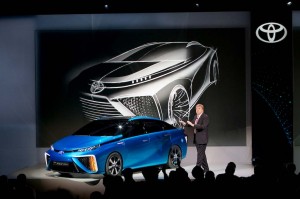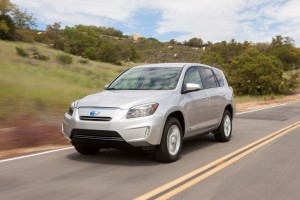Toyota is pulling the plug on the RAV4-EV, the battery-electric version of the soft-roader it introduced two years ago with the help of electric vehicle start-up Tesla Motors.
This year’s phase-out of the RAV4-EV comes as the Japanese giant gets ready to launch its new hydrogen-powered FCV, which made its debut at the Tokyo Motor Show last autumn. While it has been the most successful manufacturer of conventional hybrids, Toyota has repeatedly expressed its concerns about pure battery-electric vehicles relying on advanced lithium-ion batteries.
The move also comes as Tesla gets ready to launch its own, first battery-electric SUV, the Model X due to market something in 2015.
“Our contract called for Tesla to supply approximately 2500 battery-electric powertrains for the RAV4 EV. We anticipate that volume will be achieved this year,” noted John Hanson, Toyota’s national manager of advanced technology communications.

Toyota's Bob Carter showed off the FCV hydrogen car concept vehicle at CES. A production model debuts next year.
The decision to end the RAV4-EV project raises questions about the relationship between Toyota and Tesla, the Japanese maker serving as a strong and early partner for the Silicon Valley-based battery-carmaker. In fact, founder Elon Musk has credited the ties between the two as having helped Tesla get through a tough financial period before it was able to launch production of its first volume electric vehicle, the Model S sedan.
(Sales up, but Tesla drops $50 mil into the red for Q1. Click Here for the full story.)
Toyota has not only invested in Tesla but it sold the smaller maker its old assembly plant in Fremont, California, where the Model S is now assembled. In turn, Tesla provided not only the batteries but the basic drivetrain for the RAV4-EV.
But the end of production of the RAV4-EV doesn’t mean that the two companies have parted ways.
Hanson noted that the Japanese maker has “a good relationship with Tesla and will evaluate the feasibility of working together on future projects.”

Tesla's Model X, the company's next gen vehicle, also utilizes cameras instead of traditional side view mirrors.
What those are, neither carmaker is saying. But Tesla is busy ramping up its own production and getting ready to launch not only the Model X but also a smaller, more affordable battery car that is expected to come to market under $50,000, potentially giving the company a more mainstream audience than the Model S, which currently can run as high as $110,000 when fully loaded.
(Check out BMW’s new i8 plug-in sports car. Click Here for a first drive.)
Though Toyota makes it sound like it simply decided to let the RAV4-EV program run its natural, limited course, there could be other factors at work. Tesla, for example, has been struggling to get enough batteries to meet projected future demand. Founder and CEO Musk recently unveiled his so-called Gigafactory project, designed to be the world’s largest lithium-ion battery plant when it gets into production by decade’s end.
As for Toyota, the maker has been openly skeptical about the potential of lithium-ion power, even running a recent ad that focused on the limitations of battery technology. Notably, it has stuck with more time-tested – if less powerful – nickel-metal hydride batteries for its familiar hybrid models, such as the segment-leading Prius line.
Meanwhile, Toyota is getting ready to launch into the emerging hydrogen market with its first production model, the FCV, introduced in Tokyo last November. The vehicle uses a fuel-cell stack to provide electric current for a drive system not unlike that in battery cars like the RAV4-EV. But the FCV will get about 200 miles on a tank of hydrogen and can be refilled in minutes, rather than the hours EVs need to recharge.
The big challenge is the lack of a hydrogen refueling infrastructure, though there are aggressive steps underway to expand the availability of hydrogen pumps in the Southern California region where the FCV will be sold.
Toyota has to hope it gains traction with its hydrogen car. Like its competitors, it will have to meet California’s tough new Zero-Emissions Vehicle, or ZEV, mandate with a minimum number of sales each year.
While Toyota considers the “feasibility” of future ventures with Tesla, the California-based EV maker has established additional ties with Daimler AG. It provided the drivetrain for the first battery version of the Smart Fortwo, known as the Electric Drive. And it developed the drivetrain for the new Mercedes-Benz B-Class Electric Drive just going on sale in the U.S.
A senior Daimler official told TheDetroitBureau.com last week the company is currently evaluating additional product opportunities with Tesla.
(Click Here to read our review of the new Mercedes B-Class Electric.)

